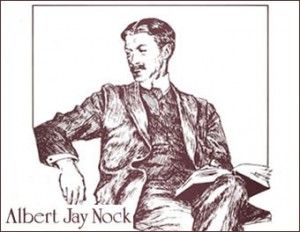Monday

Nock Notions
“The decade 1887-97 was one of the most extraordinary periods in all the history of America's fantastic civilization; even the period 1929-39 can do but little more than match its bizarre eccentricities. . . . Free silver, the initiative, referendum and recall; farmer-labourism, votes-for-women, popular election of senators, the Wisconsin Idea, populism, prohibition, the Square Deal, direct primaries, Coxey and his army, Carry Nation and her hatchet, Coin Harvey and his primer”“the list is without end.” Nock, Henry George.
Now combine that fact with this observation from Chodorov's The Rise & Fall of Society: "It was not until some years after the Civil War, when three centuries or productive effort bore fruit in a general increase of wealth and leisure, that reform became a major interest in this country. During the last quarter of the nineteenth century there was a hatful of reforms from which the citizen could take his pick, and every one of them began with the promise that political power could improve the lot of man economically, socially, morally, and even culturally."
Chodorov's point, taken from Nock, who borrowed from Franz Oppenheimer, is that the political means--whether it's Attila's raids or Goldman Sachs' and GM's--don't occur until there's something to attack. Once a society accumulates wealth through enterprise, it becomes a target of people who want to raid it.
It's interesting that even Karl Marx would agree with this. I remember reading that he didn't think Russia would make a good target for Communism, since it wasn't developed enough. In other words: A country needs a lot of wealth in order to make it a worthwhile target of the political (predatory) means of acquisition. Of course, Marx didn't put it this way, but then again, no government proponent does. The political/predatory avenues are always presented in terms of social reform or betterment, even though they (the actual predators, not the dupes who vote for it) don't mean it any more than Attila meant to improve Roman society through his military/predatory means.
Although a person might disagree with the Oppenheimer/Nock/Chodorov interpretation of what happened in the late nineteenth century, the juxtaposition of wealth increase and social reform can't be doubted. Every school child knows that the late nineteenth century brought about the industrial revolution and a huge increase in our country's wealth, even if those same school children are (erroneously) taught that the wealth was concentrated in the hands of the industrialists. Most economic historians also realize now that the position of the common man was also improving in the late nineteenth century, albeit at a much slower pace than the improvement experienced by the New Rich (just as my wealth has increased much slower than Mark Zuckerberg's).
I also believe it is common knowledge that social reform also reached a fever pitch in the late nineteenth century, taking on new levels of fervor and even a different taste. In case it's not common knowledge, I offer this observation from Christopher Lasch's The New Radicalism in America: "Everyone who has studied the history of American reform agrees that the reform tradition underwent a fundamental change around 1900." (1997, p. xiii).
